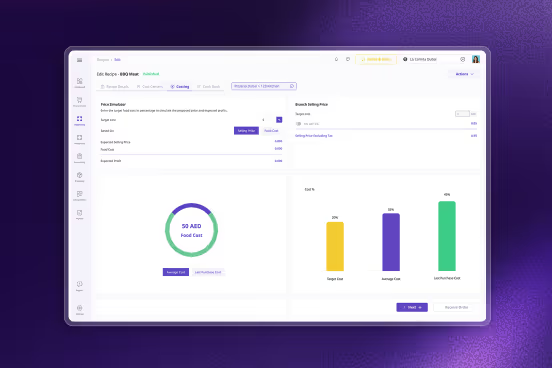The Role of a Restaurant Operations Manager: Skills, Duties, and Impact

Running multi‑unit restaurants is a balancing act. Operators are constantly juggling cost control, team morale, guest experience and the health of the business. At the centre of that juggling act sits the operations manager. Having spent two decades in kitchens, dining rooms and boardrooms, I’ve learned that the best ops managers aren’t just supervisors – they’re coaches, analysts and culture builders rolled into one. In this practical guide, I share what today’s restaurant operations manager does, the skills that separate high performers from the rest and how you can set them up for success.
What an Operations Manager Owns Day to Day
In a typical week, operations managers wear many hats. On slow days they focus on planning and process – reviewing P&L statements, forecasting labour, checking supplier invoices and coaching under‑performing team members. During peak periods they pivot to real‑time problem solving: keeping service running smoothly, adjusting staffing on the fly and jumping in wherever there’s a bottleneck. Their responsibilities include:
- Cost control: watching labour, cost of goods and waste, and adjusting purchasing or schedules when variances appear.
- People management: recruiting, training, setting expectations, giving feedback and building a culture of accountability.
- Process adherence: making sure SOPs are followed – from opening and closing checklists to line checks, food safety logs and weekly audits. They also schedule and lead manager walks, weekly reviews and monthly stock counts.
- Customer experience: monitoring guest feedback, mystery shopper scores and online reviews, then coaching teams to improve.
- Strategic planning: aligning day‑to‑day operations with company goals, rolling out new initiatives, and communicating with head office.
These tasks change depending on seasonality. During slower months, managers might refine SOPs and cross‑train staff. During holidays or promotions, the focus shifts to throughput and consistency across locations.
Skills That Separate High‑Performing Ops Managers
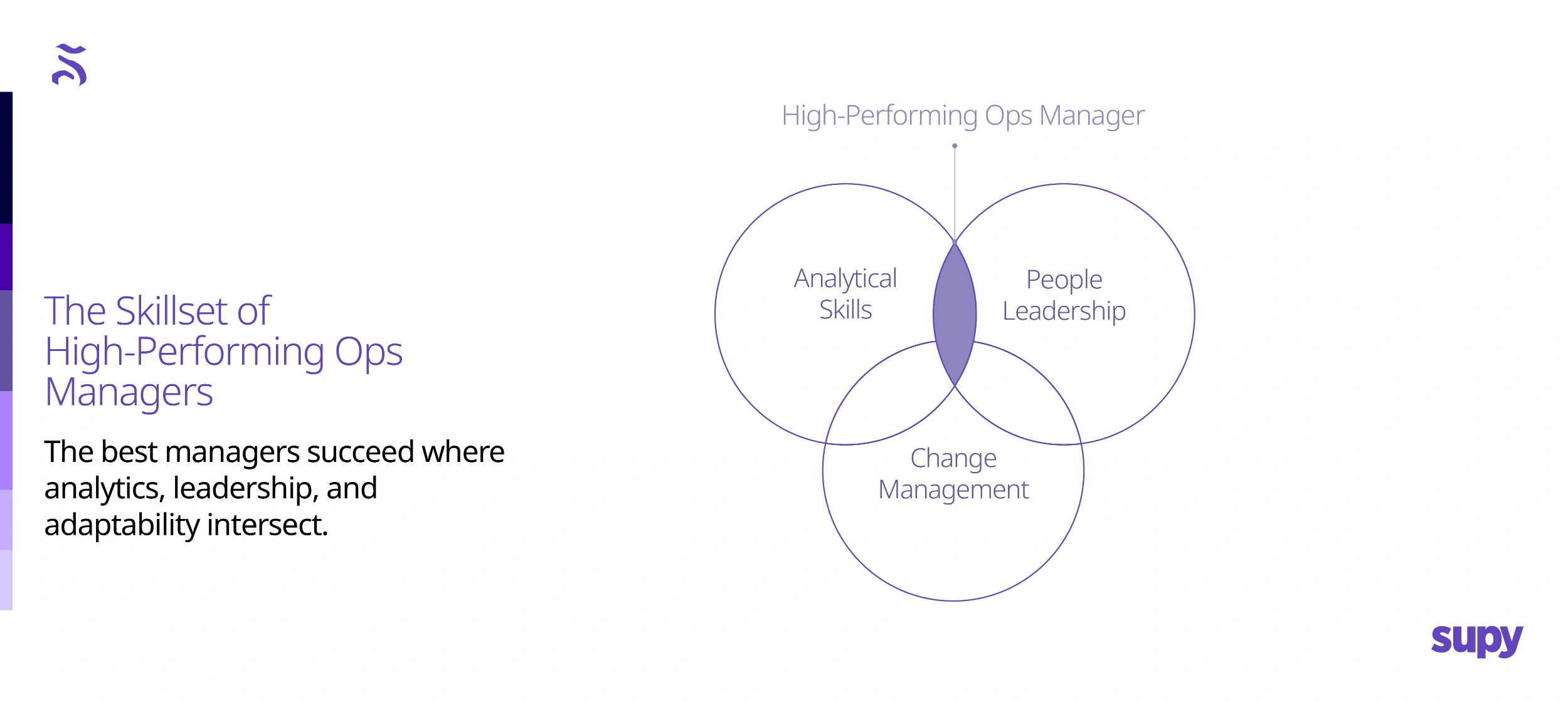
Having recruited and mentored dozens of managers, I’ve noticed patterns. High performers share three strengths:
- Analytical mind: they don’t just look at sales; they understand contribution margins, labour cost per labour hour and waste percentages. They know how to interpret dashboards to spot red flags and ask “why?”
- People leadership: they inspire teams through coaching rather than commanding. They communicate clearly, give constructive feedback and set an example on the floor. When there’s conflict, they resolve it without damaging morale.
- Change management: restaurants evolve constantly – new menus, new systems, new health regulations. The best managers embrace change, train their teams and monitor adoption.
You can spot these qualities during interviews by asking candidates to walk through a recent problem they solved, how they coached a low performer and how they implemented a change across multiple units.
Critical Decisions and Inputs
Every week brings multiple decisions – sometimes contradictory. Do you cut labour to hit payroll budgets or keep staff to maintain service levels? Do you run a promotion that increases sales but hurts margins? The inputs to these decisions include:
- Sales and labour reports: real‑time data helps managers decide when to call in staff or send them home.
- Variance reports: daily counts and waste logs show where recipes aren’t followed or ordering is off. Small variances compound quickly.
- Guest feedback: comment cards, social reviews and Net Promoter Scores reveal whether cost cuts are impacting experience.
- External factors: weather, local events and supply chain disruptions influence planning.
High‑performing managers balance speed, quality and cost. When trade‑offs arise, they’ll cut costs where guests won’t notice (e.g. renegotiating supplier contracts) and invest in areas that directly impact the guest (staff training, quality ingredients).
Differences Across Concepts and Scale
The core skills remain the same whether you’re running a quick‑service brand or a fine‑dining restaurant, but the emphasis differs:
- QSR: throughput and consistency are king. Managers need to drive labour efficiency, ensure recipes are followed precisely and monitor speed of service metrics. Decision‑making is decentralised; store managers often have authority to adjust staffing.
- Casual dining: experience and team engagement matter. Managers focus on guest interaction, upselling and staff empowerment. They have more freedom to tweak menus or promotions.
- Fine dining: standards and training are paramount. Managers pay close attention to wine programs, service choreography and personalising guest experiences. They work closely with chefs on menu changes.
As you scale from a handful of units to dozens, the role shifts from hands‑on to strategic. Operators need to develop middle management, standardise reporting and invest in systems that give visibility across locations. Franchise environments add another layer: managers must drive compliance while respecting franchisees’ autonomy.
Operating Cadence and SOPs
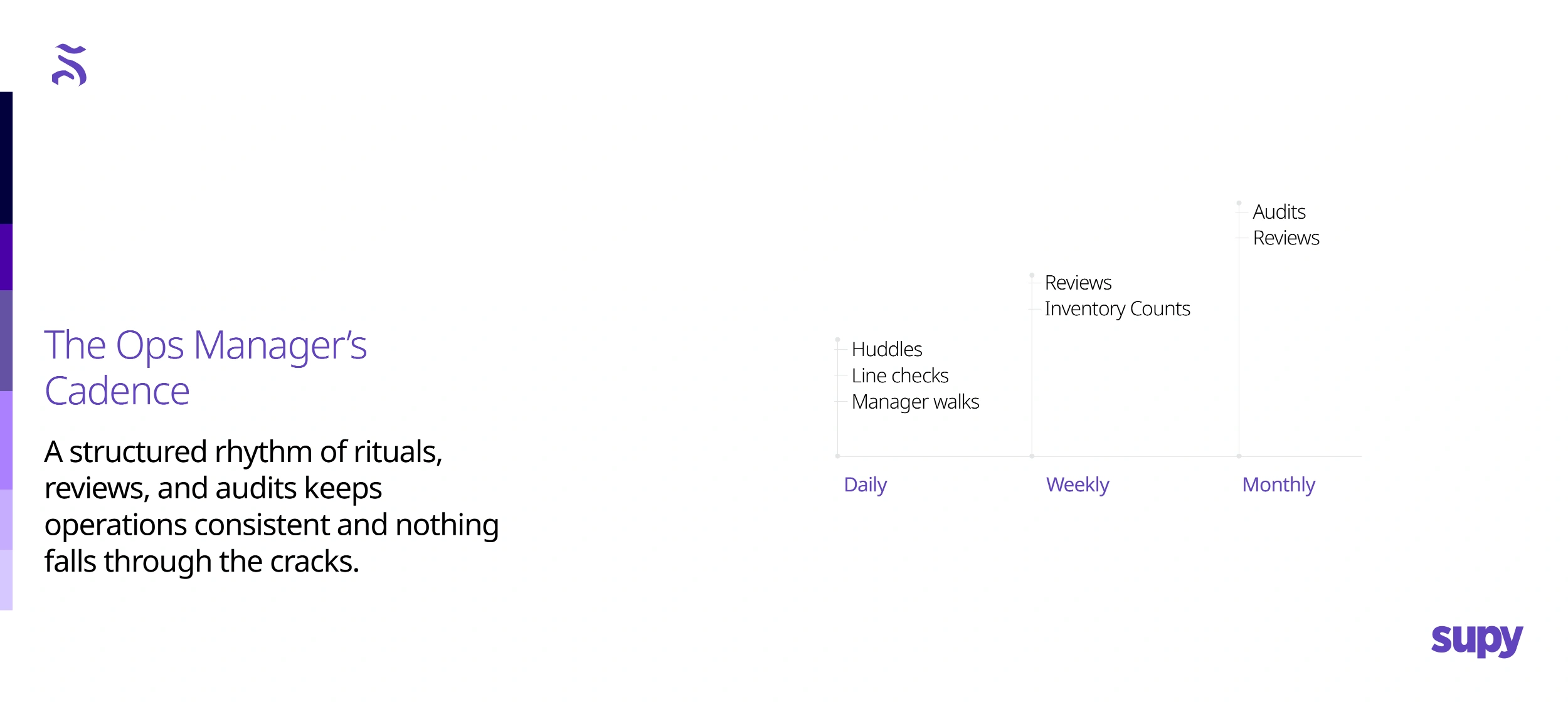
A strong cadence keeps everyone aligned and ensures nothing falls through the cracks. In my experience, the following rhythm works well:
- Pre‑shift huddles: 5‑minute meetings to communicate goals, menu changes and staff assignments.
- Line checks: before service, managers or supervisors verify mise en place, recipe adherence and equipment. Any gaps are addressed immediately.
- Manager walks: at least once per day, the manager walks the front and back of house to observe, coach and recognise good work.
- Daily inventory counts: spot checks on high‑value items such as steaks, seafood and spirits control shrinkage.
- Weekly reviews: managers review labour and cost reports, plan schedules and adjust orders with their teams.
- Monthly audits: full stock counts, food safety inspections and financial reviews catch longer‑term issues.
Creating SOPs is only half the battle. Effective managers train their teams on why the process exists and monitor compliance. They set clear expectations and reinforce them with recognition and corrective coaching.
Where Ops Managers Make a Measurable Impact on P&L
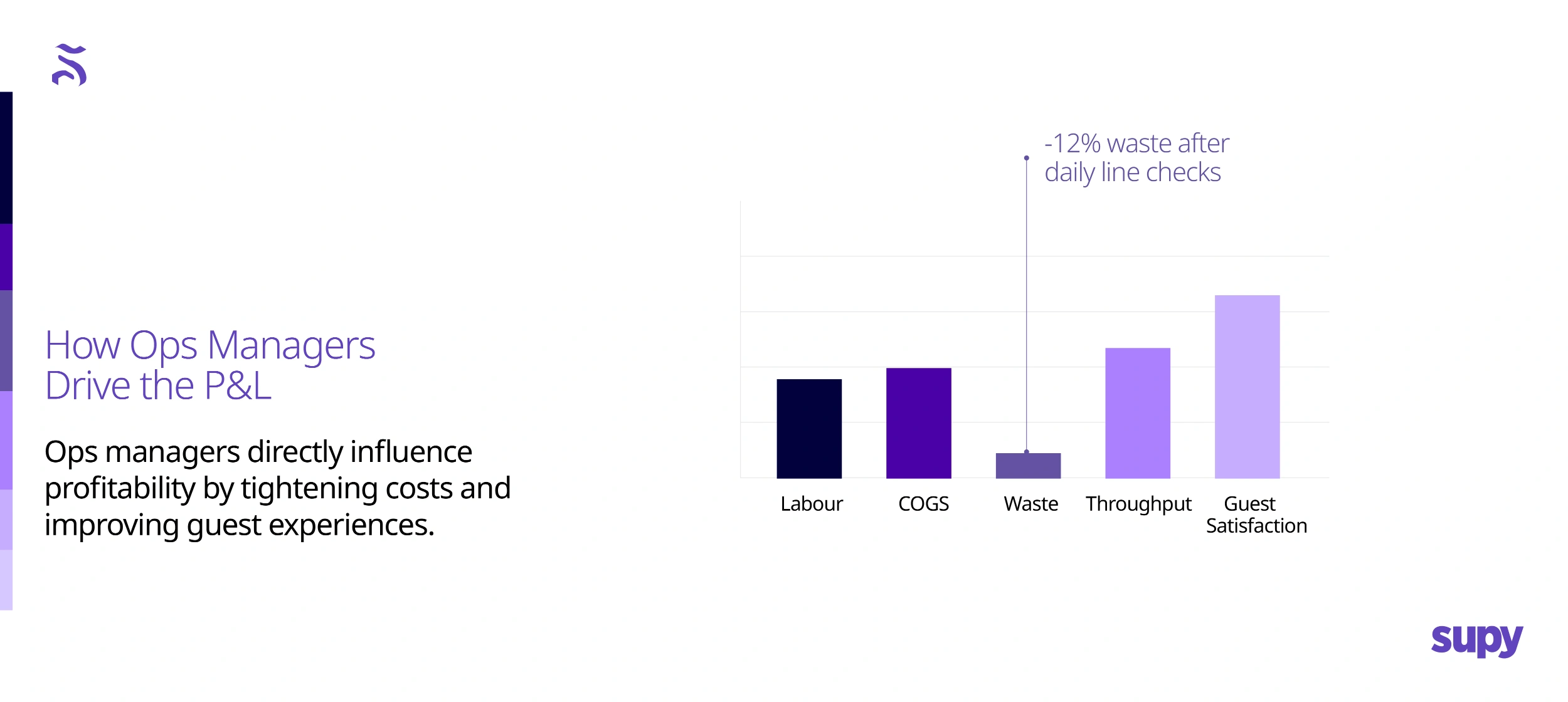
Operations managers influence nearly every line of the P&L, but their biggest levers are:
- Labour: optimising schedules around forecasted demand, cross‑training staff and monitoring labour cost per labour hour.
- Cost of goods sold (COGS): ensuring recipes are followed, negotiating with suppliers and conducting regular counts to reduce theft and waste.
- Waste: tracking spoilage, over‑portioning and inefficient prep. Teaching cooks to prep to par levels rather than over‑prep.
- Throughput: improving order accuracy and speed of service to increase sales per labour hour.
- Guest satisfaction: happy guests return and spend more. Monitoring satisfaction and addressing complaints quickly reduces churn.
Proof of impact comes from monthly financials and guest feedback. For example, after implementing daily line checks and portion control training, one of our teams reduced weekly chicken waste by 12 %, saving thousands per year.
Common Pitfalls and How to Avoid Them
New operations managers often make predictable mistakes:
- Not delegating: trying to do everything themselves leads to burnout and stagnating team growth.
- Ignoring data: relying on gut feeling rather than using dashboards to confirm or refute assumptions.
- Over‑scheduling: fearing they’ll be shorthanded, they schedule too many staff, which erodes margins.
- Training gaps: rolling out new systems without proper training results in partial adoption and frustration.
You can prevent these by investing time in training, setting clear expectations, using data to guide decisions and trusting your team. Build in a learning curve for new tools and be transparent about the why behind changes.
A First 90‑Day Playbook for New Ops Managers
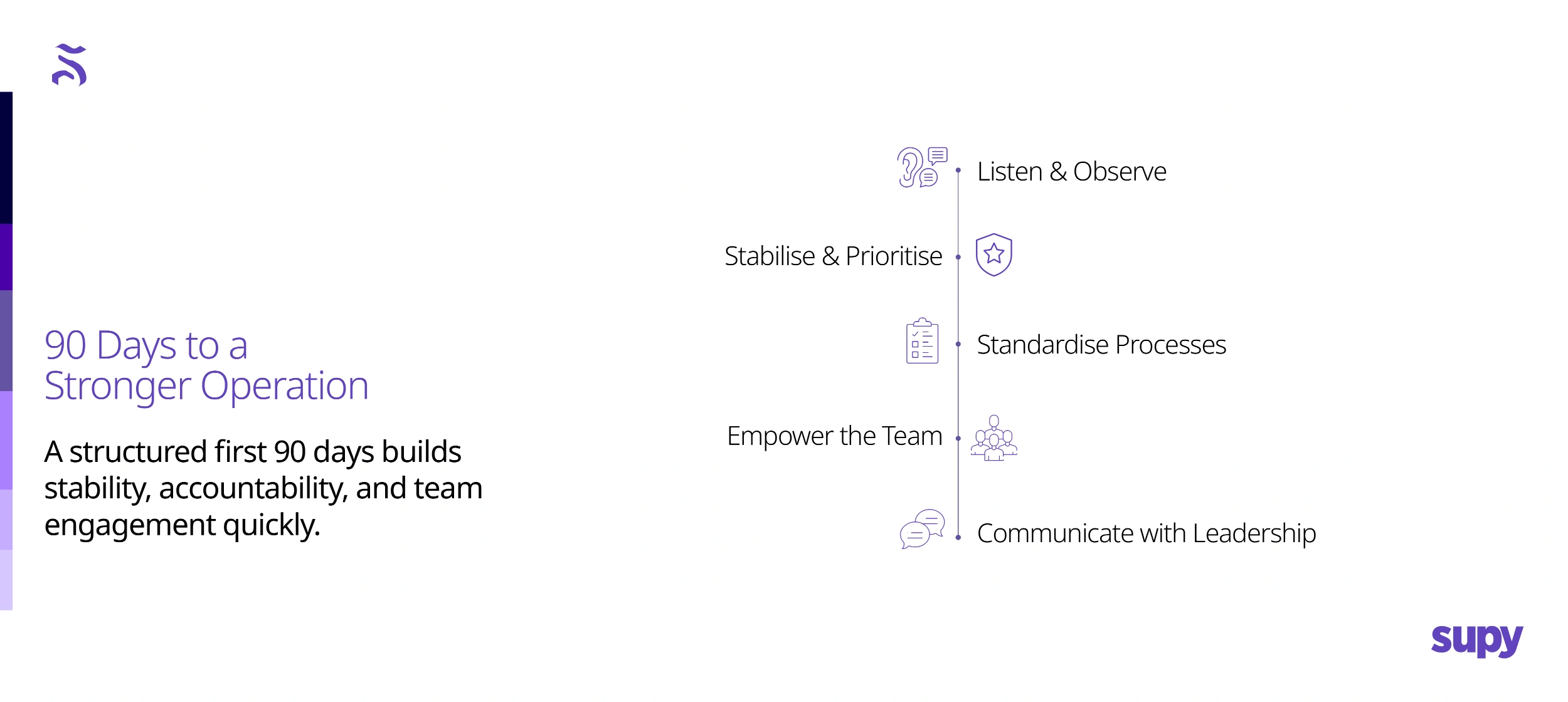
If you’re stepping into an operations role or inheriting a troubled site, focus on:
- Listen and observe: spend the first two weeks watching service, talking to teams and analysing reports. Identify quick wins (e.g. obvious waste) and root causes of bigger problems.
- Stabilise and prioritise: fix urgent issues first – safety, hygiene, scheduling gaps. Communicate your plan to the team.
- Standardise processes: review existing SOPs, fill gaps and implement daily rituals (huddles, line checks, counts). Train everyone and set accountability.
- Empower the team: delegate tasks, coach supervisors and recognise good performance. Share performance data so everyone sees progress.
- Communicate with leadership: update head office on wins and challenges. Align on targets and resources.
By day 90, you should see more consistent service, lower waste and a more engaged team.
Conclusion
Smooth operations don’t happen by accident; they’re built on processes, empowered teams and clear visibility. If you’re curious about how modern tools can give you real‑time insights and automate the tedious parts of operations, check out our latest deep dive on Modern Operations Execution. And if you’d like to see how Supy’s platform helps operators monitor food costs, enforce SOPs and simplify reporting across multiple sites, book a demo here. We’d be happy to walk you through it.
Related Resources
